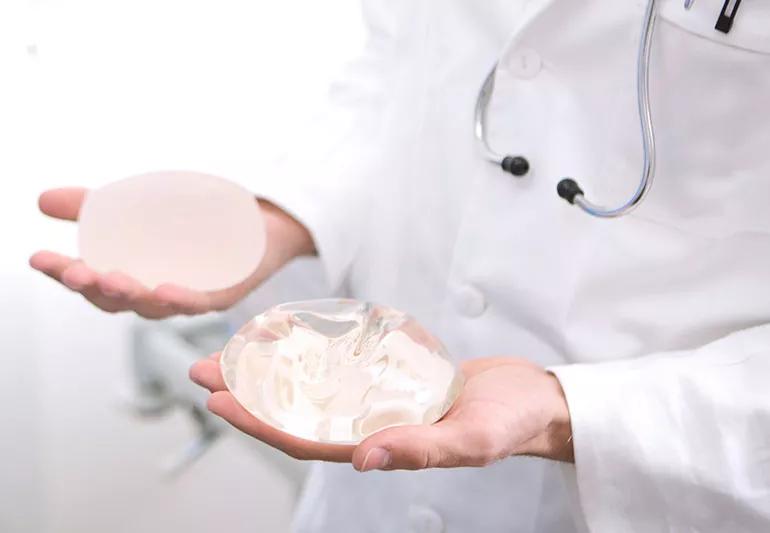A plastic surgeon explains what you need to know

Image content: This image is available to view online.
View image online (https://assets.clevelandclinic.org/transform/ae968029-5616-4c95-968f-23a85c15250d/breastImplantChoices-182712788_770x533_jpg)
doctor holding different breast implants
If you’re considering breast implants — whether it’s for breast augmentation or reconstruction after a mastectomy — you may find that there’s an overwhelming amount of information out there. Knowing your options and the facts about implants can help you through the process.
Advertisement
Cleveland Clinic is a non-profit academic medical center. Advertising on our site helps support our mission. We do not endorse non-Cleveland Clinic products or services. Policy
Plastic surgeon Graham Schwarz, MD shares some facts and tips about breast implants that can help you sort through all the information.
Before you dive into breast implant facts, it’s important to understand why women want to have breast revision surgery. It could be for any of the following reasons:
Your reasoning behind wanting breast implants can now be guided by the following facts:
Despite previous concerns, extensive research has shown that silicone implants are just as safe as saline ones.
It’s important to point out that even though the safety of implants has been proven, the risk of developing breast implanted associated lymphoma (BIA-ALCL) exists and is very low and is associated with textured implant surfaces. We recommend electing for smooth surface implants instead.
There’s no expiration date on your breast implants, but they are not considered lifetime devices.
“There is no convincing medical reason to routinely replace an intact implant every 10 years,” says Dr. Schwarz. “More than 80% of women don’t have any problems with implant rupture at that point.”
Advertisement
“If your implant is silicone-filled, it’s recommended to have an MRI test every few years to make sure that it is intact,” he says. “If there is a rupture or leak, then the implant should be removed or replaced.”
Because manufacturers design silicone gel to stay in place after implant rupture, chances are that you may not notice if there is an issue, explains Dr. Schwarz. The Food & Drug Administration does recommend medical imaging to check the implant’s integrity beginning at five years and every two years after that.
If yours ruptures, replacement is recommended. If your saline implant leaks, your breast size will decrease. So, you may opt to replace it for cosmetic purposes.
Over time, life changes could mean that you’ll need additional breast surgeries. As you age, your anatomy alters. If you have children, your size and shape could shift, and your implant could move.
Some women may develop thicker scar tissue that starts to wrap around implants. In those cases, you might need surgery for a replacement or revision.
Having breast implants doesn’t take away your ability to breastfeed. Women may or may not be able to successfully breastfeed depending on many factors, but there’s no evidence that breastfeeding is unsafe for you or your baby. Women who have mastectomy and implant breast reconstruction cannot breastfeed because milk ducts in the breast tissue are removed.
Your implants can’t always be as big as you want. The size of your rib cage, as well as the thickness and elasticity of your skin also play a role. The greater your skin’s laxity, the greater your ability to stretch and accommodate larger implants without stretch marks.
Keep in mind, though, larger implants often require revision surgeries in the future.
Although some cosmetic surgeons without formal plastic surgery training offer breast implant procedures, it’s better to work with a board-certified plastic surgeon.
They have extensive, rigorous training and undergo peer review. They have experience with all aspects of the surgery, even when it comes to breast implant removal. And, they’re trained to handle any complications, however rare, that might arise.
One complication post-surgery is what some women describe as having fatigue, brain fog, muscle and joint pain and even rash, referred to as “breast implant illness.” Your board-certified surgeon will assess your situation to determine if removal is the best course of action.
If you’re going for a certain look with implants, it’s helpful to bring a photograph that illustrates your goal when you consult with your surgeon. You might not achieve the exact result you want, but it’s a helpful starting point in the process for the surgeon to see what you’re hoping for.
Advertisement
Whatever your breast implant desires are, consult with your doctor to determine the best course of action.
Advertisement

Delivered every Tuesday!
Sign up for our Health Essentials emails for expert guidance on nutrition, fitness, sleep, skin care and more
Learn more about our editorial process.
Advertisement
These cosmetic surgery procedures can help restore your body to your pre-pregnancy form
The procedures take different approaches to eliminate saggy, baggy skin around your eyes
An insecurity can turn into an unhealthy obsession
Work with your doctors to find the best approach for breast reconstruction
Surgeon addresses common brachioplasty questions
What you need to know to enjoy safe, good results from plastic surgery
Most recommended precautions center around minimizing bruising or swelling
Type 2 diabetes isn’t inevitable with these dietary changes
Applying a hot or cold compress can help with pain
Pump up your iron intake with foods like tuna, tofu and turkey